
Level Up Your Business Today
Join the thousands of people like you already growing their businesses and knowledge with our team of experts. We deliver timely updates, interesting insights, and exclusive promos to your inbox.
Join For Free💳 Save money on credit card processing with one of our top 5 picks for 2025
From setting up your account to navigating fees, learn how to make a PayPal business account work for your small business!
When you use PayPal to do business, a PayPal business account gives you a plethora of advantages over a standard personal account. If you’re wondering how to make a PayPal business account, and comparing PayPal with full-service merchant accounts, we wrote this guide for you.
Table of Contents
A PayPal business account gives you business features, both free and paid, that can be highly beneficial to any online merchant. There are three options for taking payments, two of which carry no monthly fees. You’ll get access to numerous eCommerce integrations, including Shopify, Magento, and BigCommerce.
What’s more, merchants who sell in person will get access to PayPal Zettle — PayPal’s in-house POS app — along with a number of top-notch POS integrations.
Other PayPal business account features include:
Of course, many other payment processors offer similar tools, so what’s the advantage of using PayPal for Business? PayPal itself would point to a recent study about checkout conversions finding that when a customer chooses PayPal as their payment method, they go on to complete the transaction 88.7% of the time — an average conversion rate 60% higher than that of other digital wallets and 82% higher than the average conversion rate of all other payment methods.
A PayPal business account makes it simple and easy to send money back and forth. Whether you offer online subscription services, sell your wares at “meetspace” events like crafting shows and conventions, or collect donations for a nonprofit organization, PayPal for Business has plenty to offer.
The requirements to set up a PayPal business account are pretty minimal. You’ll need the following:
This will be enough to start selling, though after you start actually accepting payments and making money, PayPal may request further documentation, such as bank statements. Third-party processors like PayPal and Square are notorious for their stringent scrutiny of merchants, which can result in account holds or terminations at the slightest whiff of trouble, so be ready to provide whatever information PayPal might ask for.
Read our piece on avoiding account holds, freezes, and terminations to educate yourself on this important topic.
Here are the main benefits of getting a PayPal business account.
Here’s how to make a PayPal business account.
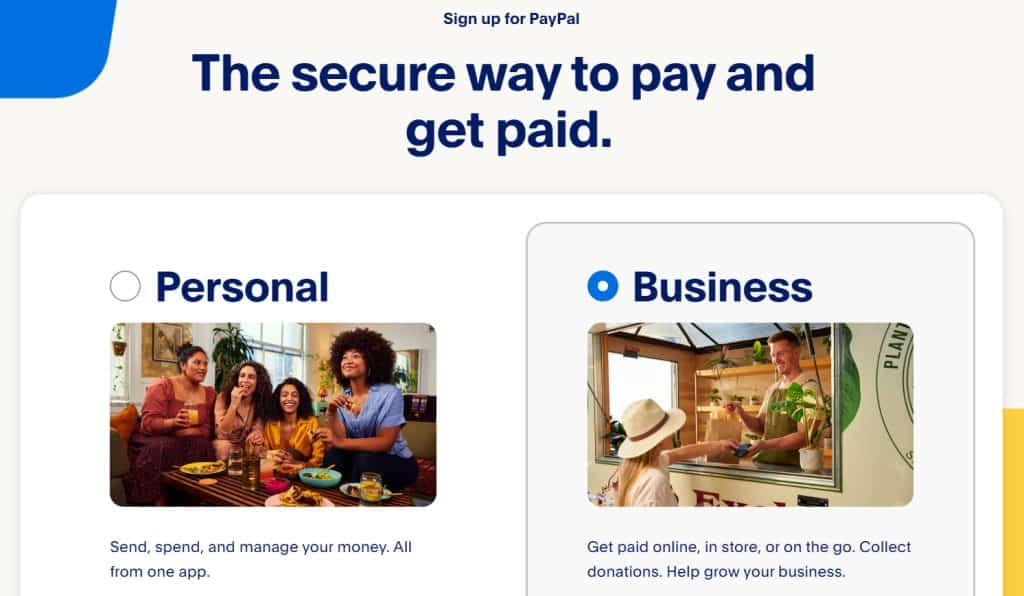
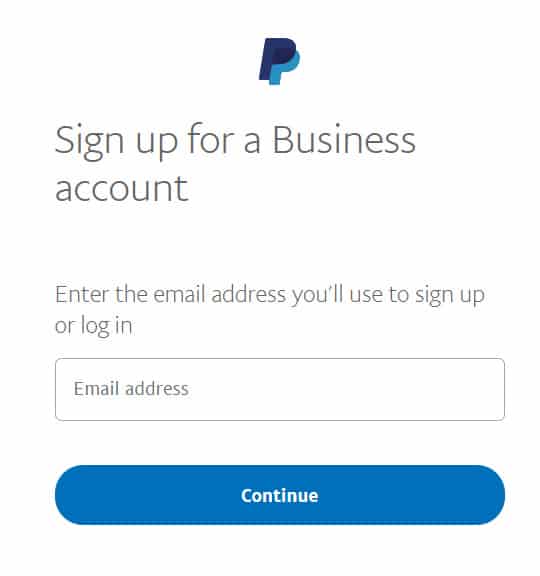
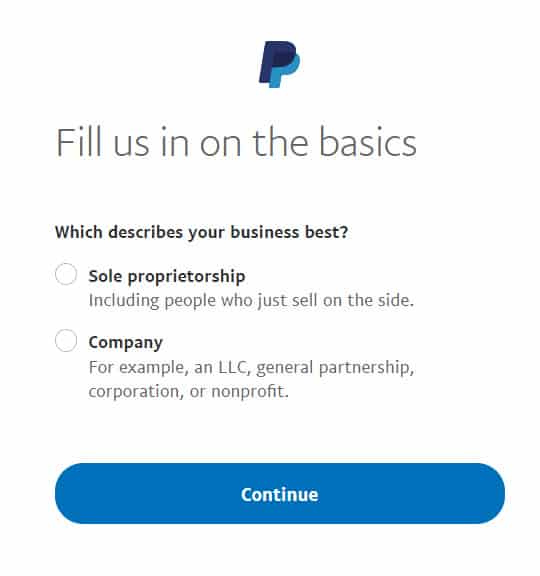
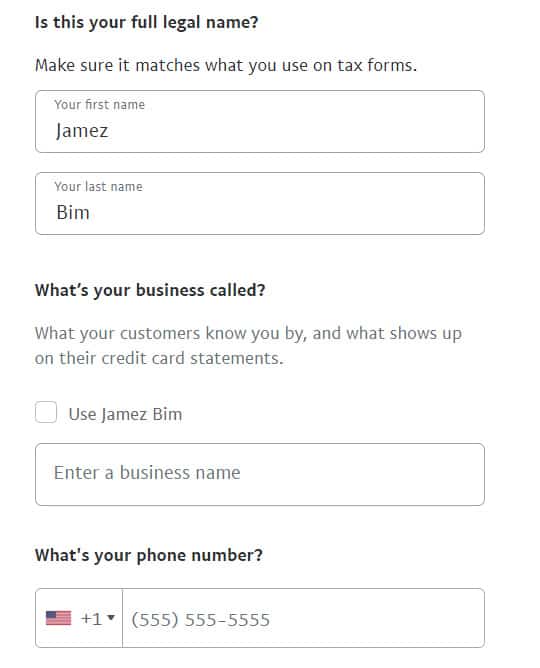
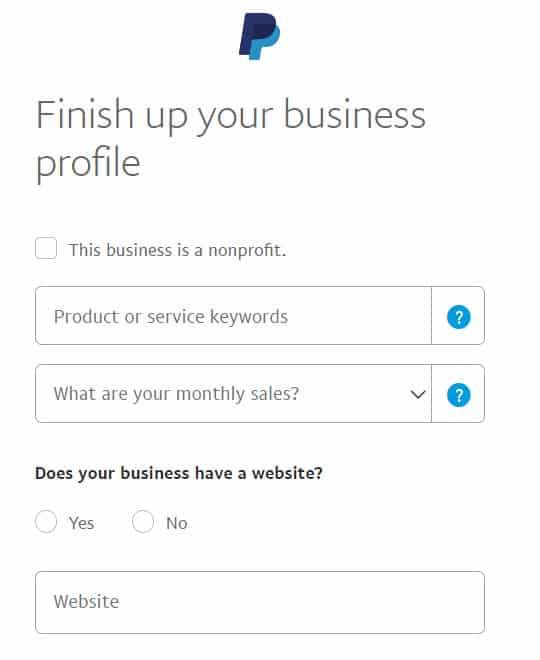
Once you’ve completed these steps, congratulations! You now have a PayPal business account.
All types of businesses that comply with PayPal’s Acceptable Use Policy can use a PayPal business account.
If your business is a sole proprietorship, you can use a PayPal business account. Even if you don’t have a registered business and are just doing some selling on the side, you can still get a PayPal business account if you choose “Sole Proprietorship” in the account signup process. As discussed earlier, if you choose this option, you won’t have to provide an Employer Identification Number (EIN) when you sign up.
Note that any income you earn through your business account will be reported by PayPal to the IRS as business income whether or not your business is registered. Check out our guide to registering a business for more information about this process.
If your business is a partnership, corporation, or LLC, you can sign up for a PayPal business account by choosing “Company” during the signup process. The process will be largely the same as it is for sole proprietors, though you will be asked to provide your EIN.
Note that while nonprofit organizations can use a PayPal business account to accept payments, you’ll need to provide additional information verifying your 501(c)(3) nonprofit status with PayPal in order to process donations at the discounted charity rate. Read our guide to PayPal for nonprofits for details on how to do this and for a larger discussion of the pros and cons of using PayPal as a registered nonprofit.
When comparing PayPal business accounts vs personal accounts, know that both account types allow you to send and request money, make purchases, and even receive payments for sales you make — so long as you mark these sales as being for “Goods and services,” thus incurring transaction fees (and PayPal will check to make sure you’re not dodging transaction fees by mislabeling transactions).
However, without a business account, you won’t have access to a host of commerce-facilitating features such as creating shipping methods, inventory tracking, allowing employees partial access to your account, and signing up for services like PayPal Zettle. Furthermore, a business account gives you more privacy, as you can make and receive payments with your business name. With a personal account, you’ll have to use your own legal name.
When you create a PayPal business account, you have three options for how you want to accept payments.
If you want to add PayPal as a supplementary payment option to your existing online store or if you already integrate with an eCommerce provider, PayPal Checkout is a solid choice. You’ll get PCI compliance (PayPal redirects customers to its secure site to complete the transaction), contextual checkout buttons, and localized payment methods for European customers. Also, your buyers won’t need a PayPal account — they can pay with a credit or debit card.
PayPal Checkout is free to sign up for, and there are no monthly fees.
PayPal Payments Advanced is a more fully-featured payment solution than PayPal Checkout. For $5/month, Payments Advanced offers the same eCommerce integrations as PayPal Checkout while also letting your customers check out directly on your website. You’ll also get a healthy dollop of additional features:
PayPal Payments Pro costs $30/month to use. It’s for merchants who want complete control over the checkout process. It’s also the only PayPal business plan that gives you a virtual terminal (which you can implement without Payments Pro, but it’ll still cost $30/month). Here’s what you’ll get with PayPal Payments Pro:
You can set up a PayPal business account without paying anything. Of course, free payment processing doesn’t exist. Payment processing fees will apply when you make a sale through PayPal. Unfortunately, under the pricing scheme PayPal enacted in 2021, small-ticket merchants and those who rely on small donations/tips will pay more in fees than they would using many PayPal competitors.
Here are the per-transaction fees US-based merchants will pay:
Keep in mind that the Virtual Terminal costs $30/month, whether you get it as a standalone feature or you get it through Payments Pro.
Overall, for mid-sized and larger businesses, PayPal’s fees are mostly comparable to those of other third-party processors, but merchants with small average ticket sizes will be disadvantaged by the high fixed portion of the transaction fees (49 cents on each online transaction). Competitors like Square and Shopify have the edge in this category. Their fixed fee for online transactions is 30 cents, and both offer a virtual terminal with no monthly fee.
This article doesn’t cover every single PayPal fee. For more on the costs of such things as card readers, conversion fees, and chargeback fees, read our article on PayPal pricing. And if you’re a seller outside the US, have a look at PayPal’s complete list of merchant fees, as the fixed portion of your transaction fees (with a 2.59% + $0.49 transaction fee, the 49 cents is the fixed part) will vary based on the currency you use.
If you’ll be using your PayPal account for business purposes, getting a PayPal business account is the obvious move to make. But how does PayPal stack up against competing payment processing solutions?
Overall, despite its shortcomings, PayPal is a solid option for merchants. With simple, transparent pricing and extensive eCommerce integrations, PayPal works particularly well as a starter option for new businesses and will scale with your business as it grows. What’s more, online sellers can always choose to use PayPal as a supplemental means of accepting payments. This isn’t the case with most of PayPal’s competitors.
PayPal has plenty to offer offline sellers as well — using either PayPal Zettle or one of the many shopping carts that integrate with PayPal, you’ll be able to take payments anywhere with ease. Small-ticket online merchants will likely save money on transaction fees by going with another processor, though. This is, by far, our biggest issue with PayPal.
Read our full PayPal review for a truly in-depth look into PayPal’s pros and cons as a merchant services provider. But it’s good to check out PayPal alternatives if PayPal’s fee structure doesn’t suit your business or if you’re still comparison shopping.
Get in touch with a real human being on the Merchant Maverick team! Send us your questions, comments, reviews, or other feedback. We read every message and will respond if you'd like us to.
Reach OutGet in touch with a real human being on the Merchant Maverick team! Send us your questions, comments, reviews, or other feedback. We read every message and will respond if you'd like us to.
Reach Out
Let us know how well the content on this page solved your problem today. All feedback, positive or negative, helps us to improve the way we help small businesses.
Give Feedback
Want to help shape the future of the Merchant Maverick website? Join our testing and survey community!
By providing feedback on how we can improve, you can earn gift cards and get early access to new features.
 Whether you're looking to save money on processing or to get approved for a merchant account, PaymentCloud can help.
Get Started
Whether you're looking to save money on processing or to get approved for a merchant account, PaymentCloud can help.
Get Started
Help us to improve by providing some feedback on your experience today.
The vendors that appear on this list were chosen by subject matter experts on the basis of product quality, wide usage and availability, and positive reputation.
Merchant Maverick’s ratings are editorial in nature, and are not aggregated from user reviews. Each staff reviewer at Merchant Maverick is a subject matter expert with experience researching, testing, and evaluating small business software and services. The rating of this company or service is based on the author’s expert opinion and analysis of the product, and assessed and seconded by another subject matter expert on staff before publication. Merchant Maverick’s ratings are not influenced by affiliate partnerships.
Our unbiased reviews and content are supported in part by affiliate partnerships, and we adhere to strict guidelines to preserve editorial integrity. The editorial content on this page is not provided by any of the companies mentioned and has not been reviewed, approved or otherwise endorsed by any of these entities. Opinions expressed here are author’s alone.
 Whether you're looking to save money on processing or to get approved for a merchant account, PaymentCloud can help.
Get Started
Whether you're looking to save money on processing or to get approved for a merchant account, PaymentCloud can help.
Get Started